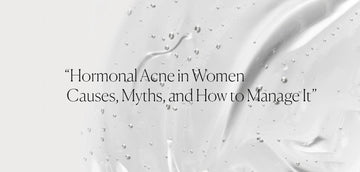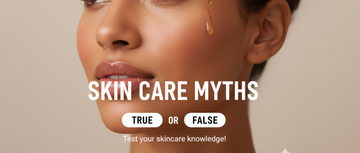Introduction: When Acne Doesn’t Go Away After Teen Years
For many women in Pakistan, acne doesn’t end after teenage years. Instead, it appears around the chin, jawline, and lower cheeks, often flaring before periods or during times of stress. This type of breakout is known as hormonal acne.
Hormonal acne can be frustrating, but with the right lifestyle changes and skincare routine, it can be managed effectively.
What Causes Hormonal Acne?
Hormonal acne is driven by fluctuations in hormones particularly androgens like testosterone which increase oil production and clog pores.
Main triggers include:
-
Menstrual cycle changes (flare-ups before periods).
-
PCOS (Polycystic Ovary Syndrome).
-
Stress and lack of sleep.
-
High-sugar or dairy-heavy diets.
Common Myths About Hormonal Acne
-
“It means your skin is dirty.” → False. It’s hormonal, not hygiene.
-
“Only teenagers get acne.” → False. Many women develop it in adulthood.
-
“Home remedies like toothpaste or lemon help.” → False. They can damage skin.
What You Can Do: Diet & Lifestyle Tips
Add More
-
Fruits & vegetables → rich in antioxidants.
-
Omega-3s → walnuts, flaxseeds, fish (help balance oil).
-
Green tea → anti-inflammatory benefits.
-
Water → keeps skin hydrated.
Cut Back On
-
Sugary foods and refined carbs.
-
Fried and greasy fast food.
-
Excess dairy (milk, cheese, ice cream).
-
Processed snacks high in fats.
A cleaner diet helps reduce flare-ups and makes treatments more effective.
Skincare Recommendations for Hormonal Acne
-
Gentle Cleanser → Twice daily, avoid harsh foaming washes.
-
Targeted Serum →
-
Salicylic Acid (to unclog pores).
-
Azelaic Acid (to calm redness & fade dark marks).
-
Antioxidants like Blueberry Extract (to reduce inflammation).
FADE Acne Control Serum is one example combining these ingredients.
-
-
Toner for Oil Control → Helps refine pores and reduce shine.
GRIP Oil Control Toner supports balance without over-drying. -
Moisturizer → Lightweight, non-comedogenic.
-
Sunscreen → SPF 50+, daily (mandatory with acne treatments).
Mistakes to Avoid
-
Overusing exfoliants (strips the barrier).
-
Skipping moisturizer (dehydrated skin produces more oil).
-
Not wearing sunscreen (makes scars worse).
-
Ignoring stress and sleep major hormonal triggers.
Conclusion: Managing Hormonal Acne the Smart Way
Hormonal acne isn’t just about skin it’s tied to your body, lifestyle, and routine. The best way to manage it is with a combined approach:
-
Balance your diet to avoid flare-ups.
-
Manage stress & sleep to stabilize hormones.
-
Use targeted skincare with Salicylic Acid, Azelaic Acid, and antioxidants to clear breakouts and fade marks.
Consistency is key. With the right choices, you can reduce hormonal acne flare-ups and move towards calmer, clearer skin.



